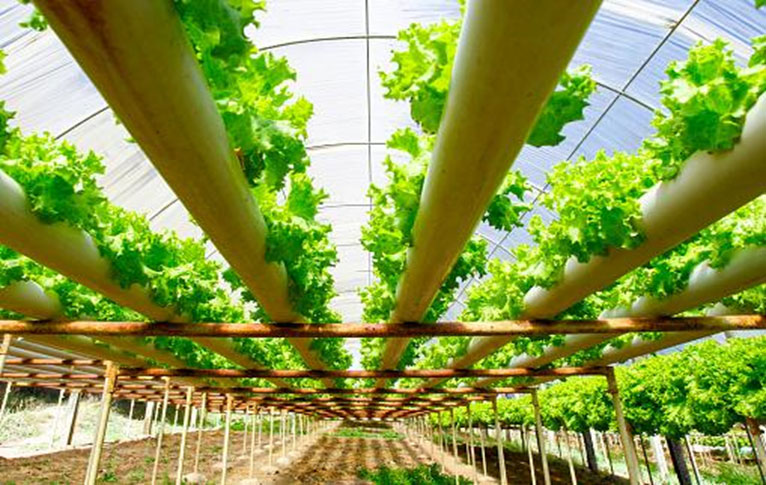One of the most compelling advantages of hydroponics is its remarkable water efficiency. Another is its versatility that extends beyond fruits and vegetables to address production of livestock fodder
DOUGLAS RASBASH*
As Botswana grapples with its 17th officially declared drought since 1966, the urgency to address food security has never been more paramount. With traditional agricultural methods facing the harsh realities of the country’s arid climate, it is time for a paradigm shift.
Hydroponic cultivation emerges as a beacon of hope, offering a sustainable solution that can revolutionise Botswana’s agricultural landscape and secure its food future. Hydroponics, the practice of growing plants without soil in nutrient-rich water, presents a game-changing opportunity for Botswana. Unlike traditional farming that heavily relies on soil and is vulnerable to erratic weather changes, hydroponics transcends geographical limitations. Its controlled environment allows for year-round cultivation, irrespective of external conditions, making it particularly well-suited for Botswana’s dry climate.
90% less water
One of the most compelling advantages of hydroponics is its remarkable water efficiency. In a country where water scarcity is a constant concern, traditional field irrigation methods simply aren’t sustainable. Hydroponic systems utilise up to 90% less water compared to conventional farming, a staggering near-total contrast that cannot be overlooked. By conserving precious water resources, hydroponics not only mitigates the impact of droughts but also alleviates pressure on existing water supplies, ensuring their availability for other essential needs.
Furthermore, hydroponic cultivation boasts significantly higher yields than traditional farming methods. With optimal growing conditions carefully controlled, plants thrive and produce abundant harvests consistently. This increased productivity is a potential game-changer for Botswana, offering the capacity to bolster food production and reduce dependency on imports.
By embracing hydroponics, Botswana can enhance its food self-sufficiency and strengthen its resilience against external shocks, such as global supply chain disruptions and/or price fluctuations. The versatility of hydroponics extends beyond fruits and vegetables because it also presents an opportunity to address another critical aspect of Botswana’s agricultural sector: livestock fodder.
Green fodder, essential for the health and productivity of livestock, is often scarce during prolonged droughts, leading to significant economic losses for farmers. Hydroponic systems can efficiently produce nutritious fodder crops such as barley, maize, and alfalfa, providing a sustainable solution to feed livestock all year-round. By integrating hydroponic fodder production into agricultural practices, Botswana can safeguard its livestock industry and bolster rural livelihoods.
Environmental benefits
Moreover, hydroponics offers environmental benefits that align with Botswana’s commitment to sustainability. By eliminating the need for chemical pesticides and fertilisers, hydroponic cultivation minimises environmental pollution and reduces the ecological footprint of agriculture. Additionally, hydroponic systems can be designed using renewable energy sources such as solar power, further reducing their carbon footprint and contributing to Botswana’s efforts to combat climate change. As the world increasingly shifts towards sustainable practices, embracing hydroponics would position Botswana as a progressive leader in agricultural innovation and environmental stewardship.
However, realising the full potential of hydroponics in Botswana requires strategic investment and supportive policies from decision-makers. Government initiatives to incentivise hydroponic farming through subsidies, technical assistance, and research funding can stimulate widespread adoption and facilitate knowledge transfer among farmers. Collaborations with international organisations, research institutions, and private sector partners can further accelerate the development and dissemination of hydroponic technologies tailored to Botswana’s unique context.
Tangible benefits
Education and awareness campaigns are also crucial to dispel misconceptions and build trust in hydroponic farming among stakeholders. By showcasing successful case studies and demonstrating the tangible benefits of hydroponics, decision-makers can garner support from farmers, communities, and investors. Investing in training programmes and capacity-building initiatives would empower local farmers with the skills and knowledge needed to transition to hydroponic cultivation successfully.
Furthermore, integrating hydroponics into Botswana’s broader agricultural strategy requires a holistic approach that addresses infrastructure, market access and regulatory frameworks. Developing agro-industrial parks equipped with hydroponic facilities can create hubs of innovation and entrepreneurship, fostering economic growth and job creation in rural areas. Strengthening market linkages and value chains for hydroponic produce can ensure that farmers receive fair prices for their crops, incentivising investment and expansion.
In conclusion, hydroponic cultivation holds immense promise for Botswana’s quest for food security in the face of recurring droughts and climate uncertainties. By harnessing the water-saving advantage of hydroponics, productivity gains, and environmental benefits of hydroponics, Botswana can transform its agricultural sector and build a resilient food system for the future. As decision-makers chart the course forward, embracing hydroponics should be prioritised as a cornerstone of Botswana’s sustainable development agenda.
The time to act is now, for the sake of current and future generations that depend on a thriving agricultural sector for their livelihoods and well-being.

